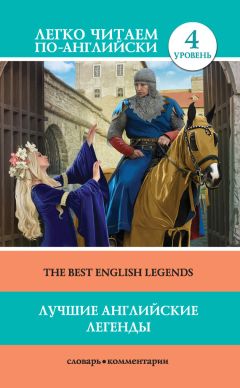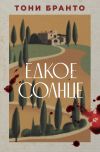Текст книги "Лучшие английские легенды / The Best English Legends"

Автор книги: Д. Демидова
Жанр: Мифы. Легенды. Эпос, Классика
Возрастные ограничения: +12
сообщить о неприемлемом содержимом
Текущая страница: 2 (всего у книги 8 страниц) [доступный отрывок для чтения: 2 страниц]
“Lords, for Christ’s sake help a poor captive out of prison.” But the guests were hard-hearted, and answered cruelly, especially the abbots and priors, who had been deceived by Sir John’s false tales. So rude was their reply that he grew angry.
“Oh,” said he, “that is all the answer I am to have to my prayer! Now I see that I have no friends. Cursed be he that ever does good to abbot or prior!”
Adam Spencer, busied about the removal of the tablecloth, looked anxiously at Gamelyn, and saw how angry he was growing. He thought little more of his service, but, making an excuse[27]27
make an excuse – находить причину
[Закрыть] to go to the pantry, brought two good oak sticks, and put them beside the hall door. Then he winked at Gamelyn, who with a sudden shout flung off his chains, rushed to the hall door, took a barrel and whirled his weapon as lightly as if it had been a holy water sprinkler. There was a dreadful mess in the hall, for the fat Churchmen tried to escape, but Gamelyn was able to scatter the prelates. Now he had no pity on these cruel Churchmen, as they had been without pity for him; he knocked them over, battered them, broke their arms and legs, and brought a terrible fear among them; and during this time Adam Spencer kept the door so that none might escape. He called aloud to Gamelyn to respect the sanctity of men of Holy Church and shed no blood,[28]28
shed no blood – не проливать крови (по обычаю, лиц церковного звания и королевской крови не позволялось пытать или казнить с пролитием крови)
[Закрыть] but if he should by chance break arms and legs there would be no sacrilege, because no blood would be shed.
Thus Gamelyn did what he wanted, laying hands on monks and friars, and sent them home wounded, while some of them muttered: “We were better at home, with just bread and water, than here where we have had such a sorry feast!”
Then Gamelyn turned his attention to his false brother, who had been unable to escape. He caught him by the neck, broke his backbone with one blow, and chained, sitting, to the post at which he had stood.
“Sit there, brother, and cool thy blood,” said Gamelyn, as he and Adam sat down to a feast, at which the servants served them eagerly, partly from love and partly from fear.
Now the sheriff happened to be only five miles away, and soon heard the news of this disturbance, and how Gamelyn and Adam had broken the peace. As his duty was, he determined to arrest the law-breakers. Twenty-four of his best men were sent to the castle to arrest Gamelyn and his steward; but the new porter, loyal to Gamelyn, denied them entrance till he knew their errand; when they refused to tell it, he sent a servant to wake his master and warn him that the sheriff’s men stood before the gate.
Then answered Gamelyn: “Good porter, go; delay my foes with fair speech at the gate till I have invented some plan. If I survive this incident, I will requite you truth and loyalty. Adam,” said he then to his steward, “Our enemies are on us, and we have no friend – the sheriff’s men surround us, we must go where our safety calls us.”
Adam replied: “Go where you want to go, I’ll follow you to the last or die abandoned. But this proud sheriffs will flee soon.”
As Gamelyn and Adam looked round for weapons, the former saw a stout post used for propping up the shafts; this he seized, and ran out of the back gate, followed by Adam with another staff. They caught the sheriff’s twenty four bold men from behind, and when Gamelyn had overthrown three, and Adam two, the rest fled.
“What!” said Adam as they were running away. “Drink a cup of my good wine! I am lord here.”
“No,” they shouted back; “such wine as yours scatters a man’s brains far too well.”
This little fight was hardly ended before the sheriff came in person with a greater group of soldiers. Gamelyn knew not what to do, but Adam again had a plan ready. “Let us stay no longer, but go to the greenwood: there we shall at least be at liberty.”
The advice suited Gamelyn, and each drank a draught of wine, mounted his steed, and lightly rode away, leaving the empty nest for the sheriff. However, when his party arrived, one of the officers dismounted, entered the hall, and found Sir John nearly dying. He released him, and summoned a doctor who healed his grievous wound, and thus enabled him to do more mischief.
Meanwhile, Adam wandered with Gamelyn in the greenwood, and found it very hard work, with little food. He complained aloud to his young lord: “Weren’t we better at home? I do not like this wood, there are too many trees, but no food or drink, or place to rest.”
“Ah! Adam,” answered Gamelyn, “Cheer yourself! A good man’s son often feels bitter woe at home!”
As they spoke sadly together Gamelyn heard men’s voices nearby, and, looking through the bushes, saw about a hundred and forty young men, sitting round a plentiful feast, spread on the green grass. He rejoiced greatly. Adam longed for a good meal, too, for they had found little to eat since they came to the greenwood. At that moment the master-outlaw saw them in the bushes, and told his men to bring to him these new guests whom God had sent: maybe, he said, there were others besides these two.
The seven bold youths went to fulfil the task, and cried to the two newcomers: “Do not move and hand us your bows and arrows!”
“Much sorrow may he bring who stops in front of you,” cried Gamelyn. “Why, with five more you would be only twelve, and I could fight you all.”
When the outlaws saw how boldly he behaved, they changed their tone, and said calmly: “Come to our master, and tell him of your trouble.”
“Who is your master?” asked Gamelyn. “He is the crowned king of the outlaws,” said they; and the two strangers were led away to the chief.
The master-outlaw, sitting on a wooden throne, with a crown of oak-leaves on his head, asked them their business, and Gamelyn replied: “He must walk in the wood who may not walk in the town. We are hungry and tired, and will only shoot the deer for food, for we are in great danger.”
The outlaw leader had pity on their distress, and gave them food; and as they ate ravenously the outlaws whispered one to another: “This is Gamelyn!” “This is Gamelyn!” Understanding all the evils that had befallen him, their leader soon made Gamelyn his second in command; and when, after three weeks, the outlaw king was pardoned and allowed to return home, Gamelyn was chosen to succeed him and was crowned king of the outlaws. So he lived merrily in the forest, and cared not about the world outside.
Meanwhile, the treacherous Sir John had recovered, and became a sheriff. He accused his brother of felony as soon as he could. As Gamelyn did not appear to answer to that accusation, he was proclaimed an outlaw, and a price was set for his life. His yeomen and vassals were grieved at this, for they feared the cruelty of the wicked sheriff; and therefore they sent messengers to Gamelyn to tell him the bad news. The youth was as furious as they had expected, and he promised to come and teach Sir John in his hall and protect his own tenants.
It was certainly very daring to go into the county where his brother was sheriff, but he rode boldly into the hall, with his hood thrown back, so that all might recognise him, and cried aloud: “God save all you here present! But, your broken-backed sheriff, evil he may be! Why has he done me such wrong and disgrace as to accuse me and proclaim me an outlaw?”
Sir John did not hesitate to use his legal powers. Seeing that his brother was quite alone, he imediately had him arrested and cast into prison, where, as was his intention, only death could release him.
All these years the second brother, Otho, had been living quietly on his own lands and taken care of the quarrels of the two others; but now, when news came to him of Sir John’s deadly hatred to their youngest brother, and Gamelyn’s trouble, he was deeply grieved, roused himself from his peaceful life, and rode to see if he could help his brother. First he asked Sir John’s mercy for the prisoner, for the sake of brotherhood and family love; but the latter only replied that Gamelyn must stay imprisoned till the justice decides otherwise. Then Otho offered to be bail,[29]29
to be bail – быть поручителем, заплатить залог
[Закрыть] if only his young brother might be released from his bonds and brought from the dismal cell where he lay. To this Sir John finally agreed, warning Otho that if the accused failed to appear before the justice he himself must suffer the penalty for the breach of bail.
“I agree,” said Otho. “Have him released at once, and deliver him to me.”
Then Gamelyn was set free on his brother’s surety, and the two rode home to Otho’s house, talking sadly of all that had befallen, and how Gamelyn had become the king of the outlaws. The next morning Gamelyn asked Otho’s permission to go to the greenwood and see how his young men were doing without him, but Otho pointed out very clearly how dreadful would be the consequences to him if he did not return. The young man then vowed:
“I swear by James, the mighty saint of Spain, that I will not leave you, nor will fail to stand my trial on the appointed day, if God Almighty give me strength and health and power to keep my vow. I will be there, so that I might demonstrate what bitter hate Sir John, my cruel brother, holds against me.”
So Otho let him go. “God shield you from shame! Come when you see it is the right time, and save us both from blame and reproach.”
So Gamelyn went to the merry greenwood, and found his company of outlaws; and so much had they to tell of their work in his absence, and so much had he to tell of his adventures, that time passed by, and he soon fell again into his former mode of life, and his custom of robbing none but Churchmen, fat abbots and priors, monks and canons, so that all others spoke good of him, and called him the “courteous outlaw.”
Gamelyn stood one day looking out over the woods and fields, and it suddenly came to his mind that he had forgotten his promise to Otho, and the day of the trial was very near. He called his young men (for he had learned not to trust honour or loyalty of his brother the sheriff), and told them to prepare to accompany him to the place of the trial, sending Adam first to learn the news. Adam returned in great haste, bringing sad news. The judge was in his place, and the jury were ready to condemn Gamelyn to death, as they were bribed by the wicked sheriff, and Otho was put in prison in place of his brother.
The news made Gamelyn very angry, but Adam Spencer was even more infuriated; he would gladly kill every person in court except Otho; but his master’s sense of justice was too strong for that.
“Adam,” he said, “we will not do so, but will kill the guilty and let the innocent escape. I myself will have some conversation with the justice in the hall; and meanwhile you, my men, hold the doors fast. I will make myself justice today, and you, Adam, shall be my clerk. We will give sentence this day, and God save our new work!”
All his men applauded this speech and promised him obedience, and the whole group of outlaws hurried to surround the hall.
Once again Gamelyn strode into the jail in the midst of his enemies, and was recognised by all. He released Otho, who said gently: “Brother, you have nearly overstayed the time; the sentence has already been given against me that I should be hanged.”
“Brother,” said Gamelyn, “this day shall your and my enemies be hanged: the sheriff, the justice, and the wicked jury.”
Then Gamelyn turned to the judge, who sat as if paralysed in his seat, and said: “Come from the seat of justice: too often you have polluted law’s clear stream with wrongs; too often you have taken reward against the poor; too often help villainy, and given judgment against the innocent!”
The justice sat still, dumb with astonishment, and Gamelyn struck him fiercely, cut his cheek, and threw him over the bar so that his arm broke; and no man dared to withstand the outlaw, for fear of his company standing at the doors. The youth sat down in the judge’s seat, with Otho beside him, and Adam in the clerk’s desk; and he dealt with the false sheriff, the justice, and the unjust jury, and accused them of wrong and attempted murder. In order to keep up the forms of law, he created a jury of his own young men, who brought in a verdict of “Guilty,” and the prisoners were all condemned to death and immediately hanged, though the false sheriff tried to appeal to the brotherly affection of which he had shown so little.
After this daring punishment of their enemies Gamelyn and his brother went to lay their case before King Edward, and he forgave them, in consideration of all the wrongs and injuries Gamelyn had suffered; and before they returned to their distant county the king made Otho the sheriff of the county, and Gamelyn chief forester of all his free forests; his band of outlaws were all pardoned, and the king gave them posts according to their talents. Now Gamelyn and his brother settled down[30]30
settle down – осесть, остепениться
[Закрыть] to a happy, peaceful life. Otho, having no son, made Gamelyn his heir, and the latter married a beautiful lady, and lived with her in joy till his life’s end.
Hereward the Wake
When the weak but saintly King Edward the Confessor[31]31
Edward the Confessor – Эдуард Исповедник, правил Англией в 1042–1066 гг.
[Закрыть] ruled in England, the land was divided into four parts, of which Mercia and Kent were held by two powerful rivals. The two earls, Leofric of Mercia and Godwin of Kent did not only dislike each other, but also each other’s families, each other’s power and wealth, and their sons were also enemies.
Their wives were as different as their lords. Lady Gytha, Godwin’s wife, of the royal family of Denmark, was imperious, arrogant and scheming, the best match there could ever be for her husband the earl, who was so ambitious that he would stick at nothing[32]32
stick at nothing – ни перед чем не останавливаться
[Закрыть] to win kingly power for his children. But Lady Godiva, Leofric’s beloved wife, was, on the contrary, a tender, religious, faithful and loving woman, who had already won an almost saintly reputation when she saved her husband’s oppressed citizens at Coventry. She then pitied the people of that town, who were suffering under her husband’s taxation. Lady Godiva asked her husband again and again to lower the sum of money they had to pay. At last he said he would do it if she agreed to ride naked on a horse through the streets of Coventry. Lady Godiva took him at his word,[33]33
take smb at their word – ловить на слове
[Закрыть] and, having asked all the people to stay indoors and shut their windows, rode through the town, clothed only in her long hair. So Leofric had to agree not to oppress his citizens anymore. Fortunately, her sacrifice awoke a nobler spirit in her husband, so he was to play a worthier part in England’s history. She, in turn, sympathized with the religious aspirations of Edward the Confessor, and would gladly have seen one of her sons become a monk, perhaps to win spiritual power over the king and his court.
For this holy vocation she chose her second son, Hereward, a wild, rebellious lad with rather an uncontrollable temper. He was a robust, strongly built youngster, with long golden curls and eyes of different colours, one grey, one blue. In vain[34]34
in vain – тщетно
[Закрыть] Lady Godiva tried to educate him for the monkish life, but he utterly refused to follow her scheme. He did not like studying and had only the most primitive knowledge of the basic subjects, but spent his time in wrestling, boxing, fighting and other exercises. He would not be inspired even with the noble ideal of knighthood, to say nothing of an ecclesiastic career. His wildness and recklessness were only increasing with his years, and often his mother had to stand between him and his father, as Hereward was sometimes bold enough to confront the earl.
When he was sixteen or seventeen he became the terror of Mercia, because he gathered a band of youths as wild and reckless as himself, who chose him for their leader, and obeyed him absolutely, however outrageous were his commands. Earl Leofric understood little of the nature of his second son, and looked upon what he was doing as evidence of a cruel and lawless mind, a threat to the peace of England, while they were, in reality, only the signs of a restless energy boiling against the background of dull life in England of that time.
The disagreements between father and son were very frequent, and Lady Godiva could foresee a bad ending of the argument every time Hereward and his father met; yet she could do nothing to prevent it. None of the men would recognize that the other could be right, and so things went from bad to worse.
Nevertheless, in all Hereward’s deeds there was no wickedness. He hated monks and loved playing tricks upon them, but took his punishment, when it came, also with cheerfulness; he robbed merchants, but then returned all that he had stolen, satisfied with that he had had fun; his band fought other bands, but it was not because of hatred, but more for exercising their strength, and the youths did not keep any offence after the fighting was over. There was, however, one feature in Hereward’s character that was not noble enough: he was jealous of admitting that any man was stronger or more attractive than him. But it cannot be denied that his vanity had solid grounds,[35]35
solid grounds – веские причины
[Закрыть] as he indeed was marked with extraordinary might and beauty.
So, what brought Earl Leofric’s terrible wrath upon his son were not matters of pointless wickedness, but of recklessness and lawless personal violence. Called to attend his father to the King’s court, the youth, who had little respect for anyone who disliked war and fighting, said something with an evident contempt for saintly king, his Norman prelate and the monks. He said it too loudly, and thereby shocked the weakly Edward, who honestly believed that piety to be the whole duty of man. But his wildness abused the king a lot. In his simple, somewhat naïve patriotism Hereward hated the Norman favourites who surrounded the Confessor; besides, he was all covered in marks of the personal injuries he received when fighting the Normans in simple boyish fights, and he kept on talking of more injuries which he gave them, until at last his father could endure the disgrace no longer.
During an audience of the king, Leofric formally asked for a permission to outlaw his own son. Edward the Confessor, surprised, but not displeased, felt even sorry as he saw the father’s affection beaten by the judge’s severity. Earl Godwin, Leofric’s greatest rival, was present in the council, too, and he pleaded to forgive the noble lad, whose faults were only those of youth. But that was sufficient to make Leofric more insistent in his petition. The curse of family feud,[36]36
the curse of family feud – (зд.) проклятие семейной вражды
[Закрыть] which afterwards made England lie powerless at the foot of William the Conqueror,[37]37
William the Conqueror – Вильгельм Завоеватель, первый нормандский король Англии; завоевал страну в 1066; правил в 1066–1087 гг.
[Закрыть] was already felt. It felt so strongly that Hereward behaved more aggressively seeing Godwin’s attempts to save him more than when learning of his father’s sternness.
“What!” he cried, “shall a son of Leofric, the noblest man in England, accept pity from Godwin or any of his family? No. I may be unworthy of my wise father and my saintly mother, but I am not yet sunk so low[38]38
sink so low – опуститься так низко
[Закрыть] as to ask a favour from Godwin. Father, I thank you. For years I have been disturbing the peace of the land, and thus have caused your displeasure; but I shall now go in exile, and in exile I may go abroad and win my fortune at the sword’s point.[39]39
at the sword’s point – (зд.) остриём своего меча
[Закрыть]”
“Win your fortune, foolish boy!” said his father. “And where will you go?”
“Wherever fate and my fortune lead me,” he replied recklessly. “I can do anything – serve the Emperor in Constantinople, kill dragons and other monsters, follow a quest to the north – but never shall Mercia see me again till England calls me home. Farewell, father; farewell, Earl Godwin; farewell, reverend king. I go. And pray that you may never need my arm, for it may happen that you will call me and I will not come.”
So Hereward rode away, followed into exile by one man only, Martin Lightfoot, who left his father’s service for that of his outlawed son. Also, that time at court Hereward first saw and liked of a lovely little Saxon maiden named Alftruda, a servant of the pious king.
Hereward was now legally outlawed in Mercia by the wish of the king himself, but the decision had only nominal weight[40]40
nominal weight – номинальный характер
[Закрыть] in Northumbria, where Earl Siward ruled almost as an independent lord. Hereward went there, for there lived his own godfather, Gilbert of Ghent, and his castle was known as a good training school for young candidates for knighthood. Sailing from Dover, the young man landed at Whitby, and made his way to Gilbert’s castle, where he was well received. His godfather was smart; he knew that an outlawry could be reversed at any time, and Leofric’s son might yet come to rule England. Thus Hereward was added to the number of other young men, mainly Normans or Flemings, who were seeking to perfect themselves in chivalry before taking knighthood. He soon showed himself a brave warrior, a superb wrestler, and a dangerous fighter, and soon no one wanted to fight the young Mercian, who beat them all in manly sports. The envy of the young Normans was only controlled by two things: Gilbert’s presence and fear of Hereward’s strength. But one day, in Gilbert’s absence, an incident occurred which placed the young exile so far above them that only by his death could they hope to stop being much inferior to him.
Gilbert kept in his castle court an immense white Polar bear, feared by all for its size and strength, and called the Fairy Bear. It was even believed that the huge beast had some family relation to old Earl Siward, who bore a bear upon his crest, and was said to have been as dangerous and strong as a bear in his youth. This white bear was so much scared of that he was kept on a chain and in a strong cage.
One morning, as Hereward was returning with Martin from his morning ride, he heard cries from the castle yard, and, reaching the great gate, entered and quickly closed it behind him, for there outside the broken cage, with broken chain dangling from his neck, stood the Fairy Bear, looking savagely round the courtyard. Not far from it stood a deadly frightened girl of about twelve years of age. She happened to stay outside when everybody rushed inside the castle. There were sounds of men’s voices and women’s cried from within, but the doors were closed, while the girl, in her terror, beat on the doors and begged them, for the love of God, to let her in. The cowards refused, and in the meantime the great bear, irritated by the dangling chain, ran towards the child. Hereward rushed forward, shouting to distract the bear, and just managed to stop him attaching the girl. The savage animal turned on the newcomer. Taking his battle-axe, the youth threw it masterly and split the skull of the furious beast, which fell dead. It was a blow so mighty that even Hereward himself was surprised at its deadly effect. Then the little girl, who turned out to be no other than the king’s servant, Alftruda, and who had been watching with fascinated eyes first the approach of the monster, and then its sudden death, now ran to Hereward, who had always been kind to the pretty child, and flung herself into his arms.[41]41
fling oneself into smb’s arms – броситься в объятия
[Закрыть]
“Kind Hereward,” she whispered, “you have saved me and killed the bear. I love you for it, and I must give you a kiss, for my dame says so do all ladies that choose good knights to be their champions.[42]42
champion – в рыцарстве – защитник дамы
[Закрыть] Will you be my champion?” As she spoke she kissed Hereward again and again.
“Where have they all gone, little one?” asked the young noble.
“We were all out here in the courtyard watching the young men at their exercises, when we heard a crash and a roar, and the cage opened, and we saw the dreadful Fairy Bear. They all ran, the ladies and knights, but I was the last, and they were so frightened that they closed the door in and left me outside; and I thought the bear would eat me, till you came.”
“The cowards!” cried Hereward. “And they think themselves worthy of knighthood when they will save their own lives and leave a child in danger! They must be taught a lesson. Martin, come here and help me.”
They put the body of the dead bear just where the castle door, opening, would show it at once. Then Hereward asked Alftruda to call to the knights inside saying that all was safe and they could come out, for the bear would not hurt them. He and Martin, listening, heard with great glee the argument within as to who should risk his life to open the door, the many excuses given for refusal, and, best of all, the cry of horror with which the knight who had dared to open the door shut it again on seeing the Fairy Bear waiting to enter. Hereward even carried his trick so far as to thrust the bear heavily against the door, making all the people within cry for the protection of the saints. Finally, when he was tired of the joke, he convinced the knights that they might go out safely, and showed how he, a youth of seventeen, had killed the monster with one blow. From that time Hereward was the favourite of the whole castle, petted, praised, beloved by all its inhabitants, except his jealous rivals.
The foreign knights became so jealous of the Saxon youth, and disliked his sarcastic humour so much that they planned several times to kill him, and once or twice nearly succeeded. This insecurity, and a feeling that perhaps Earl Siward did have some relation to the Fairy Bear and would wish to avenge his death, made Hereward decide to leave Gilbert’s castle.
The spirit of adventure was strong upon him, the sea seemed to call him; now that he had become evidently superior to the other noble youths in Gilbert’s castle, his ambition called him on. Accordingly, he took a sad leave of Alftruda, an affectionate one of Sir Gilbert, who wished to knight him for his brave deed, and a mocking one of his angry and unsuccessful rivals.
Boarding a merchant ship, he sailed for Cornwall, and there was taken to the court of King Alef, a minor British chief, who, like a true patriarch of old times, was getting rid of his children as he could, and had betrothed his fair daughter to a terrible Pictish[43]43
Pictish (прил.), Pict (сущ.). Пикты – группа племён предположительно кельтского происхождения, населявшая север и восток Шотландии в конце Железного века и раннем Средневековье. Обычаи пиктов традиционно овеяны легендами, так как фактической информации о них крайне мало.
[Закрыть] giant, breaking off, in order to do it, her engagement with Prince Sigtryg of Waterford, son of a Danish king in Ireland.
Hereward was chivalrous, and little Alftruda had made him feel pitiful to all maidens. Seeing at once how the princess hated and feared her new betrothed, a horrible, misshapen creature, nearly eight feet high, he decided to destroy him. He arranged a quarrel with the giant, and killed him the next day in fair fight. But the vengeful Pictish tribe made Kind Alef throw Hereward and his man Martin into prison, so he promised trial and punishment for them in the morning.
To the young Saxon’s surprise, the princess appeared to be as grieved and as revengeful as all the native Picts, and she not only rejoiced at the fact that the two men would be thrown in the prison and executed the next day, but herself helped to bound them. When they were left in their lonely cell, Hereward began to blame the princess for hypocrisy, and said that it was impossible for a man to know what a woman wants.
“Who would have thought,” he cried, “that that beautiful maiden loved a giant so horrible as this Pict? Had I known, I would never have fought him, but her eyes said to me, ‘Kill him,’ and I did so; this is how she rewards me!”
“No,” replied Martin, laughing, “this is how”; and he cut Hereward’s bonds. “Master, you were so angry with the lady that you could not see what was happening. I knew that she must have pretended to grieve, for her father’s sake, and when she came to test our bonds I was sure of it, for at that moment she put a knife into my hands, and told me to use it. Now we are free from our bonds, and must try to escape from our prison.”
In vain, however, they searched for an exit; it was a tiny chapel, with walls and doors of great thickness. Having tried every possible way and sitting down on the altar steps, Hereward asked Martin what good was freedom from bonds in a secure prison.
“Much,” replied the servant; “at least we die with free hands; and I believe that the princess has some good plan, if only we are ready.”
While he was speaking they heard footsteps just outside the door, and the sound of a key in the lock. The two stood ready, one at each side of the door, to make a dash for freedom, and Martin was prepared to kill any who should enter. To their great surprise, the princess entered, accompanied by an old priest. The princess turned to Hereward, crying, “Pardon me, my deliverer!”
The Saxon was still sad and surprised, and replied: “Do you now say ‘deliverer’? This afternoon it was ‘murderer, villain, cut-throat.’ How shall I know which is your real mind?”
The princess almost laughed as she said: “How stupid men are! What could I do but pretend to hate you, since otherwise the Picts would have killed you then and us all afterwards, but now you were our prisoners. How else could I have come here tonight? Now tell me, if I set you free, will you swear to carry a message for me?”
“Where shall I go, lady, and what shall I say?” asked Hereward, meekly.
“Take this ring, my ring of betrothal, and go to Prince Sigtryg, son of King Ranald of Waterford. Say to him that I am beset on every side, and pray that he comes and claims me as his bride; otherwise I fear I may be forced to marry some man of my father’s choice, like that Pictish giant. From him you have saved me, and I thank you; but if Sigtryg delays his coming it may be too late, for there are other hateful suitors who would suit my father, but not me. Ask him to come with all speed.”
“Lady, I will go now,” said Hereward, “if you will set me free from this cell.”
“Go quickly, and safely,” said the princess; “but before you go you must bind me hand and foot, and put me, with this old priest, on the ground.”
“Never,” said Hereward, “will I bind a woman; it is disgraceful!”
But Martin only laughed, and the maiden said again: “How stupid men are! I must pretend to have been overpowered by you, or I shall be accused of having freed you, but I will say that I came here to question you, and you and your man bound me and the priest, bound us, took the key, and so escaped. So shall you be free, and I shall have no blame, and my father no danger; and may Heaven forgive the lie.”
Внимание! Это не конец книги.
Если начало книги вам понравилось, то полную версию можно приобрести у нашего партнёра - распространителя легального контента. Поддержите автора!Правообладателям!
Данное произведение размещено по согласованию с ООО "ЛитРес" (20% исходного текста). Если размещение книги нарушает чьи-либо права, то сообщите об этом.Читателям!
Оплатили, но не знаете что делать дальше?








































